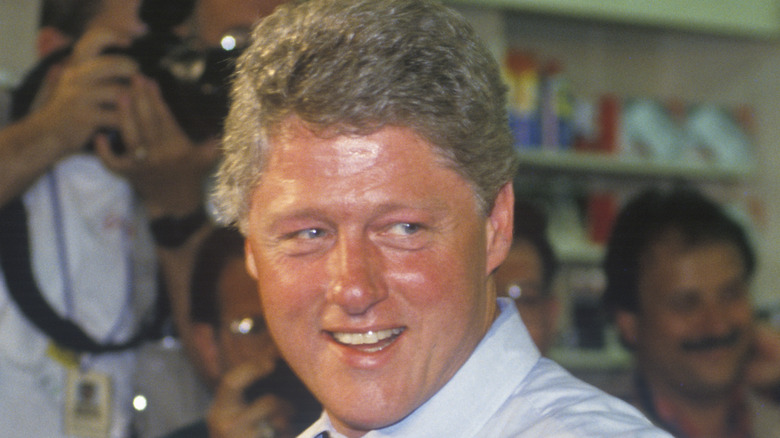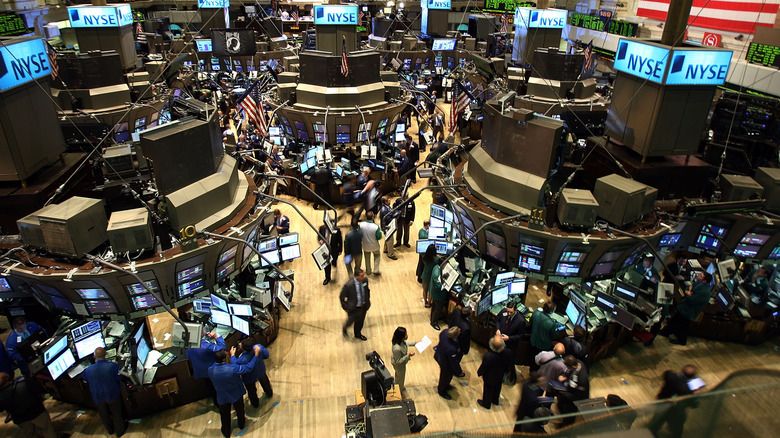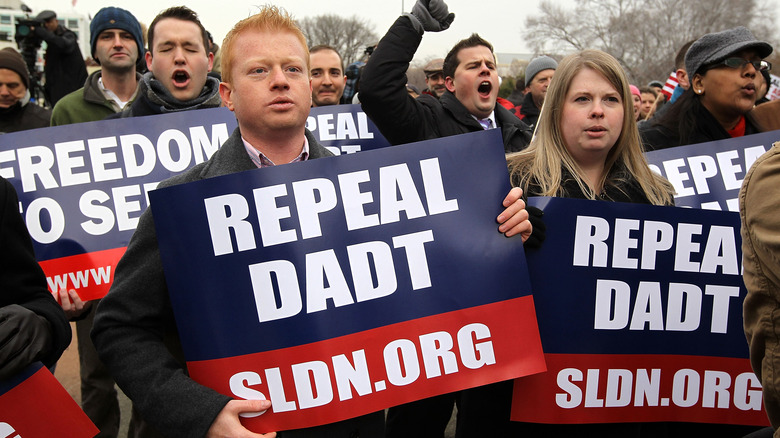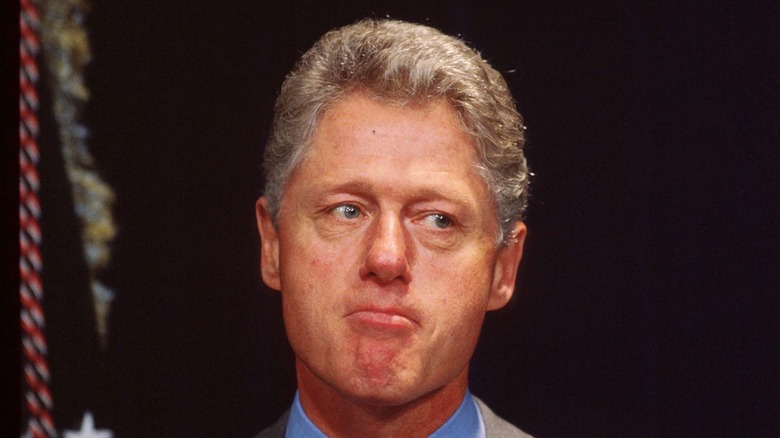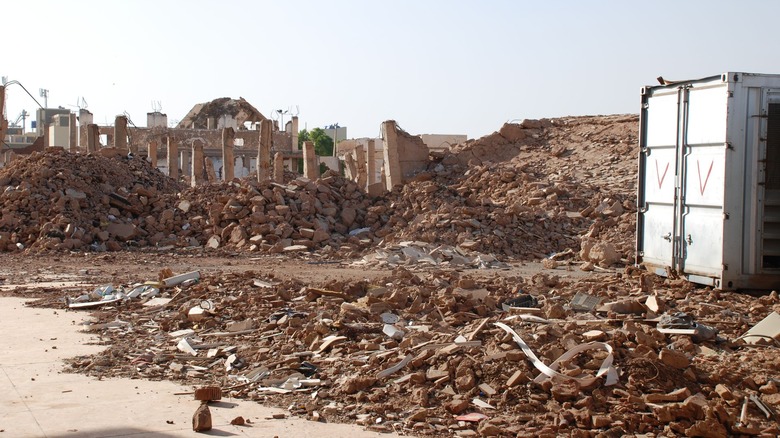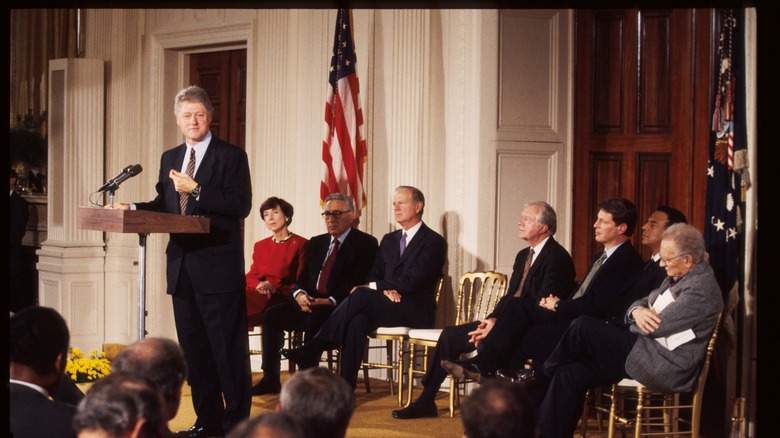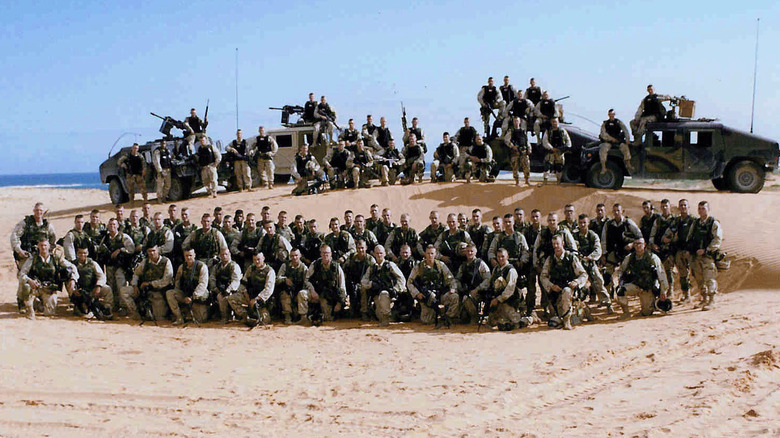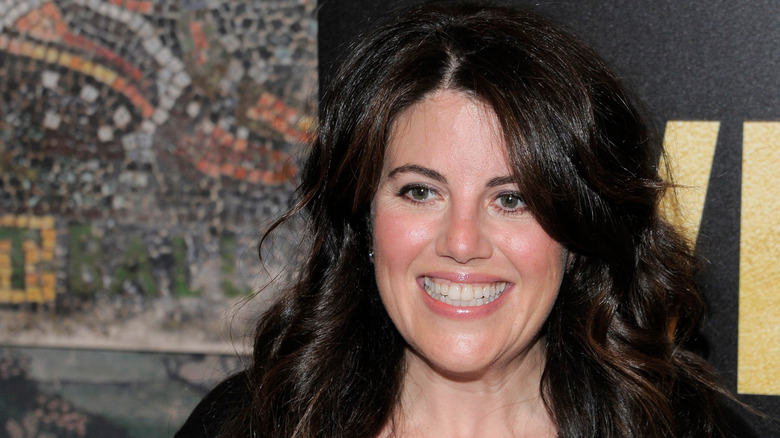Questionable Things About Bill Clinton's Presidency
Bill Clinton's presidency is often fondly remembered. The '90s was a time of economic boom for America, and the super-cool saxophone-playing president helped create a period of unprecedented economic growth that left America with a rare budget surplus (via Britannica). Clinton's easygoing manner and centrist policies also gave him widespread appeal. He was strong on women's issues, worked to reform the welfare system, and he brought unemployment to a historic low. Unusually, for an American president, he was also regarded as remarkably peaceable, thanks to his work in Northern Ireland and his landmark visit to Vietnam. According to The Guardian, at the end of his presidency, despite having been impeached in 1998, he still had an unusually high approval rating of 65%.
On the other hand, Clinton's time in office was not short of scandals. His name is nowadays synonymous with adultery but his domestic and foreign policy has frequently been attacked as well. Some of his economic legislation would go on to have unintended consequences years later, and some of his adventures abroad caused outrage around the world.
Deregulation of banks
Although Bill Clinton has often been celebrated for his economic record, some of the financial decisions he made during his presidency had dire consequences down the line. At one point, Clinton thoroughly deregulated the banking industry, arguably laying the groundwork for the 2008 financial crisis.
When the Great Depression shook America, a number of measures were enacted to prevent irresponsible opportunists from crashing the economy in a similar fashion ever again. One of these measures, the Glass-Steagall Act, was modified by the Clinton administration to give banks more leeway to do as they pleased (via NPR). According to The Guardian, Clinton's advisors tried to force him to make key decisions about the act as quickly as possible, with very little discussion.
As noted by The New York Times, Clinton's financial reforms have since faced harsh criticisms from politicians on both sides of the aisle. Once separated for safety's sake, ordinary commercial banks were permitted to carry out risky investment banking activities — aka "casino banking." Worse still, banks were allowed to grow much larger than before, becoming "too big to fail" and forcing taxpayers to eventually save them when they made horrible decisions.
Although it is debatable how large a role Clinton's amendments played in the 2008 financial crisis itself, he undoubtedly introduced a higher level of risk into the U.S. financial system. Some of the disastrous changes Clinton made were quickly reversed following the 2008 meltdown with the Dodd-Frank Act.
He helped create the housing bubble
The era of dodgy mortgages that caused America's catastrophic housing bubble began when Bill Clinton was at the helm. Insider has convincingly argued that Clinton's idealism got in the way of his good sense when he decided to make it easier for people on lower incomes to get a mortgage.
Under Clinton, banks were suddenly given positive ratings for doling out loans to people who would struggle to pay them back later. The Wall Street Journal notes that by the year 2000, firms like Fannie Mae and Freddie Mac were obligated to ensure that half of their mortgage purchases were made up of affordable-housing loans. According to a report by CNBC, run-of-the-mill mortgage down payments were eventually dispensed with altogether, and lenders stopped asking for a good credit history from their customers before throwing enormous sums of money at them.
This housing house of cards would not come crashing down until after Clinton left office — but those working in the financial services industry were already worried they were sitting on a dangerous ticking timebomb. In 2008, the housing bubble finally burst when scores of people could not pay back their mortgages and the economy went up in flames. Today, Clinton is one of several politicians whose legacy has been tainted by the financial crisis.
'Don't ask, don't tell'
On the civil rights front, Bill Clinton is best known for his "don't ask, don't tell" legislation, which was heavily criticized by many people and labeled a weak compromise. During his election campaign, Clinton promised to award homosexual men and women the right to serve in the U.S. military. However, while in office, he encountered strong political opposition to the move and was forced to introduce a controversial trade-off (via Britannica). Gay servicemen and women were permitted to work in the military provided they hid their sexual orientation. The people around them were also forbidden from asking about it.
Some have argued the measure forced legislators to sign an essentially homophobic line of thinking into law, which also didn't achieve anything. In 2009, a report by The New York Times noted that the legislation failed to safeguard top talent because thousands of men and women were still being discharged from the military anyway when their orientation inevitably came to light. In 2011, the legislation was finally repealed by the Obama administration after almost two decades of criticism and a Pentagon-led inquiry.
He pardoned a tax evader and financial fraudster
In the final days of Bill Clinton's presidency, the commander in chief shocked Americans by using his presidential pardon to forgive Marc Rich, a shady businessman and all-around bad guy, for his laundry list of financial crimes. According to Time Magazine, despite his very poor reputation, Rich was pardoned by Clinton while hiding out in Switzerland, out of the reach of the long arm of the law. The case was so controversial that even former FBI director James Comey voiced concerns about the president's decision (via NPR).
In addition to committing $48 billion dollars of tax fraud, Rich was wanted for wire fraud, conducting illegal oil deals in the Middle East, and racketeering. Although he stayed on the FBI's most wanted list for years, he also appeared on Forbes' billionaire list as late as 2010. Rich never faced justice for his crimes and continued to rake in hundreds of millions of dollars in profits until his death in 2013.
Why did Clinton decide to pardon Rich? Well, the jury is out and nothing has been proved. However, at the time some people noted that Rich's ex-wife was a major Democrat donor, and the incident led to a full-blown investigation. Clinton has since expressed some regret about the pardon which proved to be a PR disaster. While the whole affair still looks pretty suspicious, Clinton has maintained that he was acting on bad advice and was not influenced by any dodgy deals.
He refused to intervene in the Rwandan genocide
In the lead-up to the Rwandan genocide of 1994, intelligence reached the U.S. government that something terrible was about to occur. While Bill Clinton was not shy about conducting foreign intervention elsewhere, on this occasion he inexplicably stalled. Although he would later attribute his inaction to ignorance, U.S. officials were aware that genocide was possible way back during the Bush administration, according to a report by The Washington Post.
In April 1994, the Hutu majority in Rwanda conducted a 100-day-long killing spree against the Tutsi people, and the horror show became front-page news. Still, Clinton held back. Current Affairs magazine notes that although the genocide was being reported in gruesome detail already in early April, just after the killings began, Clinton's only response was to mention the violence over the radio. Declassified documents from the National Security Archives reveal that the Clinton administration decided to avoid using the word "genocide" in public so they were not obligated to get involved.
In 2013, in an interview with CNBC, Clinton finally admitted that he made a mistake, saying, ""If we'd gone in sooner, I believe we could have saved at least a third of the lives that were lost."
Anti-crime legislation
Although Bill Clinton is generally remembered as a great liberal president, his surprisingly tough stance on crime has sometimes been condemned for being overly harsh and authoritarian in nature. His 1994 Violent Crime Control and Law Enforcement Act is frequently labelled as a key driver behind mass incarceration in the U.S. (via The Guardian). Today, many of Clinton's supporters insist that the number of prisoners was already rising fast before he was elected. On the other hand, a report by Politico indicates that the prison population grew by a staggering 60% throughout the 1990s, when Clinton was in charge.
According to the ACLU, the act (then the largest crime bill ever passed in the U.S.) introduced longer sentences, more stints in prison, and truth-in-sentencing laws that reduced time off for good behavior. The scope of the death penalty was also massively expanded, while education for prisoners was dispensed with. Critics argue that Clinton's hard-line approach was an excessive and cynical attempt to appeal to right-wing voters. Others argue that he should have focused on funding community programs to tackle the root causes of crime. Instead, money was funneled into prisons and extra detention centers were built.
Sudan pharmaceutical factory bombing
One of the biggest embarrassments of Bill Clinton's presidency took place in 1998, when the U.S. bombed a pharmaceutical factory in Sudan based on questionable intelligence. ABC News reports the bombings were so devastating to the region they resulted in a $50 million lawsuit against the U.S. government. The attack caused a shortage of medicines in the already poverty-stricken region and was condemned as "either stupid or evil" by the factory's owner.
The Al-Shifa factory was supposedly destroyed because U.S. intelligence indicated it was manufacturing nerve gas. U.S. officials believed at the time that the manufacturing plant had some form of connection with terrorist Osama bin Laden. However, a report published by the Center for Nonproliferation Studies concluded the evidence for this was shaky at best. In fact, at the time, the presiding attorney general Janet Reno even tried to intervene on the grounds that the evidence was not good enough to justify a bombing.
It has often been suggested that the Clinton administration was simply jumpy because two American embassies had been bombed in quick succession earlier that year. Eager to stave off the serious threat of potential terrorism, the bombing was okayed based on contaminated soil samples collected from the ground near the factory. On the other hand, engineers who worked at the plant, as well as many independent observers, have repeatedly stated that the idea something sinister was going on at the factory is laughable.
He stopped the CIA from killing Osama bin Laden
During the early '90s, terrorist leader Osama bin Laden was already a major problem for America and the rest of the world (via History). His Al-Qaeda operatives had killed Americans in Yemen and given guns to rebels in Somalia. While Bill Clinton could not have known what would happen on September 11, 2001, he was well aware that bin Laden was a major security threat. Al-Qaeda had already helped bomb the World Trade Center once before in 1993 by the time Clinton had a chance to assassinate him.
Bin Laden was notoriously slippery, disappearing and reappearing at different locations across the world, but in 1998, the CIA located him in Kandahar in Afghanistan. According to the National Post, ex-CIA Station Chief Bob Grenier advised Clinton that they could take bin Laden out there and then, by placing explosives under a crossroads he would inevitably travel over. Clinton was fearful that innocents would die in the resulting explosion, and so denied the request.
ABC News reports that, by some eerie coincidence, Clinton voiced his regret about not killing bin Laden on the morning of 9/11 itself. Just before the twin towers were attacked, Clinton was at a business meeting in Melbourne, Australia. While speaking to his associates about terrorism he said: "He's [bin Laden] a very smart guy. I spent a lot of time thinking about him. And I nearly got him once."
He created an enormous trade deficit
In 1994, Bill Clinton's administration inaugurated the controversial North American Free Trade Agreement (NAFTA), which opened up tariff-free trade with Canada and Mexico (via Investopedia). When the deal was first proposed in Clinton's 1992 campaign, it was famously derided by one of Clinton's political opponents, who remarked the U.S. would be able to hear a "giant sucking sound" as jobs disappeared across the Mexican border.
And they were right — during Clinton's presidency, American manufacturing did take a hit. According to the Council on Foreign Relations, the U.S. trade deficit that began in the '80s massively increased throughout the '90s. Supporters of NAFTA argue the introduction of cheaper imports was actually a boon to the American economy, and that the U.S. has become a service economy that does not need to rely on manufacturing. However, this line of thinking has not comforted everybody: Working-class Americans began to experience a drop-off in their wages, a development that still causes bubbling resentment in the U.S. today.
As low-cost Mexican imports began to replace American-made goods, the number of manufacturing jobs in the U.S. went into a steep decline. Those who made automobiles and textiles were particularly badly affected and many people lost their jobs. According to a study by U.C. Berkley, by 2013, the deficit with Mexico had already reached a staggering $100 billion.
He caused a military crisis in Somalia
During the early days of Bill Clinton's presidency, he presided over an embarrassing military disaster in Somalia that caused the death of 18 Americans. NPR reports that although the U.S. was already on a humanitarian aid mission in Somalia when Clinton was elected, the new president escalated America's role. Under Clinton, the American military was suddenly tasked with the much larger mission of tracking down notorious warlord Muhammad Farah Aidid.
The U.N. was looking to arrest Aidid and after a number of American casualties occurred, Clinton agreed to get more heavily involved in their mission (via The Seattle Times). However, this challenging act of intervention proved to be more difficult than expected. History recounts that when American soldiers tried to arrest Aidid, two black hawk helicopters were shot down during the Battle of Mogadishu, a lengthy siege that lasted a full 15 hours and resulted in the deaths of hundreds of Somalis. Aidid's men went on to abuse the corpse of one of the murdered American soldiers, dragging his body across the ground in a gruesome display.
The Black Hawk down disaster (now a major motion picture) was met with outrage at home, and America's role in Somalia quickly came to a grinding halt. Clinton wound up pulling troops out of the country less than six months later.
He really did have sexual relations with that woman
Bill Clinton's best-known scandal is, of course, sex-related. As Vox magazine points out, Clinton was accused of sexual misconduct many times throughout his career, with accusations ranging from handsy behavior in the office to full-on rape. The debacle that finally landed him in hot water however, came in 1998 after Clinton had an affair with a 21-year-old intern, Monica Lewinsky (via History).
Aside from the fact that Clinton was married at the time, the age gap between them and the power dynamic created by their working relationship made their entanglement seem particularly icky. Still, he might have been forgiven if he hadn't lied about it under oath, forever damaging his reputation and almost losing his job as a result.
When the story broke, Clinton dismissed the accusations, famously stating "I did not have sexual relations with that woman." However, his farcical attempt to cover up his misdeeds ended in failure, because it turned out an associate of Lewinsky had taped her confession. Lewinsky agreed to cooperate when the FBI began to question her and Clinton was impeached. Although in the end, the Senate elected to save Clinton, his reputation has never quite recovered.
